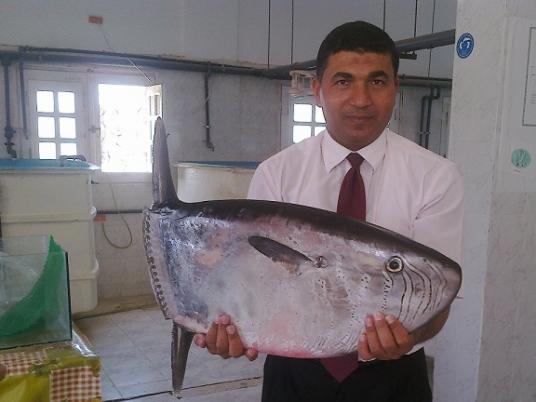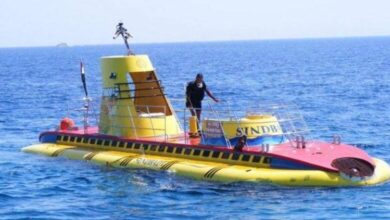
Egyptian marine scientists have criticized a recent news report that a rare sunfish had been found and bought in Hurghada, claiming the report contained false and misleading information that would be harmful to the marine environment.
The original report, published on 13 May, claimed Hurghada fishermen had caught a 2-meter-long, 150-kilogram oceanic sunfish on the Hurghada coast of the Red Sea.
The fishermen allegedly sold the massive fish to Hassan al-Tayeb, head of the Hurghada Environmental Protection and Conservation Association, for a whopping LE150,000, after which he gave the fish to a group of marine ecologists led by Mohamed Abul Regal.
Oceanic sunfish, also known as the mola mola, are rare fish on the list of endangered species, according to Mahmoud Hanafy, a marine biologist for the association.
Hanafy said oceanic sunfish live in open, oceanic waters and usually at great depths. The fish’s shape is quite peculiar and consists of a massive, moon-shaped head with a laterally flattened body and a tail, with tiny fins. They resemble pufferfish but are considerably larger.
Hanafy refuted the news report’s claims that the fish had been caught in Hurghada, insisting that Tayeb had informed him and Abul Regal that the oceanic sunfish had been caught and brought from Alexandria.
“The real origin of the fish makes a huge difference to our research,” said Abul Regal. “I don’t understand why such lies would be published.”
Both doctors rejected the report of the LE150,000 fee as highly improbable.
“How many state-paid scientists do you know who can afford to pay that much for a fish?” Hanafy asked.
Amr Ali, the Hurghada association’s managing director, warned that the news of such a high price tag would have repercussions on the Hurghada fishing community and marine life.
“I think this is ridiculous and destructive; you’re giving financial value to a rare species,” he said, adding that it was highly unlikely that the scientists could afford to pay such a fee. “It’s obnoxious; this will prompt other fishermen to try and catch sunfish to sell them for such a price.”
Interestingly enough, on the day the news was reported, Abul Regal personally caught a smaller and never-before-sighted sunfish, which he believes to be an unprecedented and groundbreaking discovery.
Although he refused to reveal the specific name of the fish before publishing his own scientific paper, he said it is a very rare species of sunfish of the Molidae family and from the same order as oceanic sunfish and pufferfish.
This type of fish — normally found in deep, open oceanic waters — has never before been sighted or registered in the Red Sea and is assumed to have migrated from the Indian Ocean.
Sunfish are considered a delicacy in certain Asian countries like Japan, but European Union regulations have banned their sale and all products derived from them because they contain poisonous toxins. Abul Regal expressed concern that fishermen would try to sell the fish for consumption, and warned of its poison.
However, Ali downplayed such concerns.
“The fishing community of Hurghada is not ignorant. They understand the [biological] value of this fish. They never eat fish meat that they don’t know, so no one would be able to sell it,” he said.
This is the second time in weeks that Hurghada’s marine life has made news.
Earlier this month, a group of association representatives led by Hanafy was delighted to witness and film the first account of mass coral spawning in the Red Sea, a phenomenon that previously only occurred in tropical waters and is believed to be stimulated by a combination of moonlight and gravitational pull.




